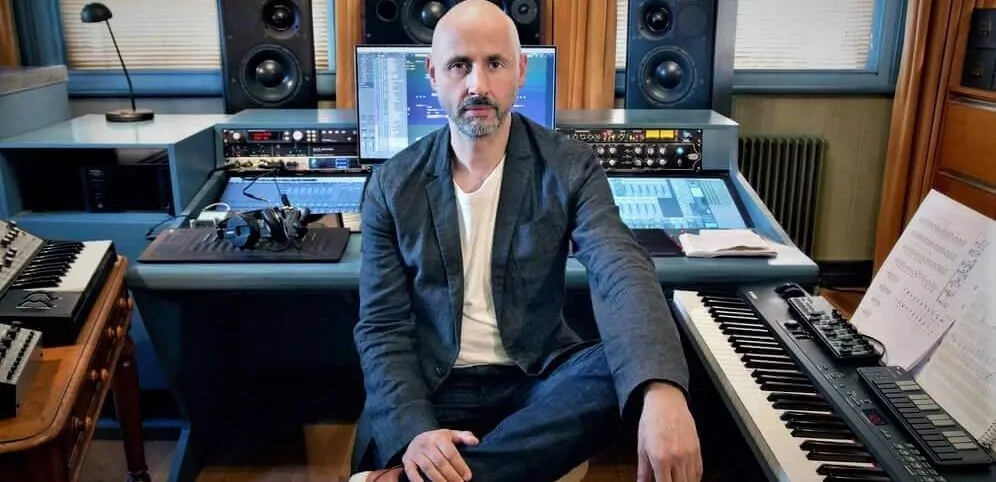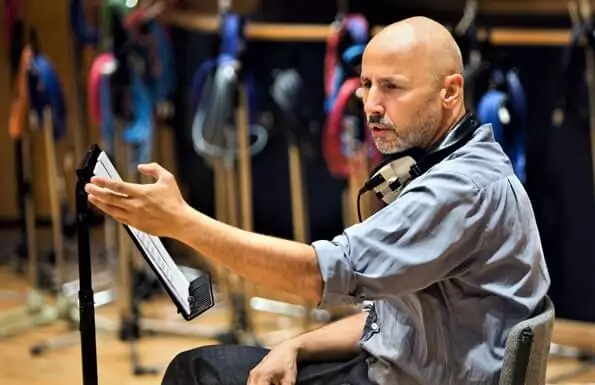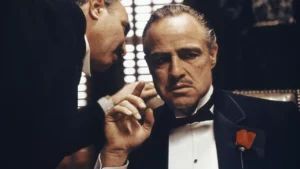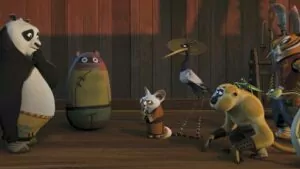DATE : 5TH OF MAY 2021

Dominik Scherrer
The UK’s top-streaming (31 million viewers) drama series The Serpent recently debuted on Netflix and has now captivated audiences internationally. The 8-part limited series tells the story of Charles Sobhraj (Tahar Rahim), a murderer, thief and seductive master of disguise, who was the chief suspect in the unsolved murders of up to 20 young Western travelers on Asia’s hippie trail in the mid-70s.
We speak with the extremely talented, Emmy Nominated, Composer of “The Serpent”, Dominik Scherrer, about his inspirations and his process behind creating the music for this engaging crime drama.
Hi, Dominik. I am Hardik Agarwal from the movie culture. How you doing today?
Dominik Scherrer: Yeah, I’m good. Thank you. It’s a nice day today here in London.
Yeah, how is the COVID situation over there?
Dominik Scherrer: Well, it’s not bad at the moment we’ve got quite a low infection rate. I’ve started to record in person again, with people at my studio, which is nice. So, that’s been happening for the last two weeks. And yeah, so, hopefully, we’re not going to have yet another wave.
Q. Alright, so first of all, congratulations on the success of The Serpent. It is truly a wonderful show. And you did a fantastic job in terms of music and the overall atmosphere of the show, so yeah, congratulations for that.
Dominik Scherrer: Thank you.
Q. Yeah, so first of all when we talk about Charles Sobhraj, he’s a global criminal. So, it was obvious that we were going to see a blend of numerous cultures and traditions, you know, whether it is the busy streets of Bangkok, or the serene snow-capped cliffs of Nepal. So, what was the process behind creating the score, which was fit for every setting, and every location that the show explored?
Dominik Scherrer: You know, the idea wasn’t really to be geographically or musicologically accurate, it was more in this sort of spirit of the early 70s or late 60s, where you have this almost conjure up a kind of cultural chaos, almost. So, the idea you have about the kind of East meets West and this kind of thing started with George Harrison jamming with Ravi Shankar and then you had other kind of East meets West, sort of influences, like Steve Rife with a gamelan, and things like that. So, in a way, it wasn’t so much about creating music that was accurate for each locale, for Hong Kong, for Bangkok, for India.
Q. Great. So, like, the idea was to be more tension and anxiety oriented, rather than, you know, be culturally accurate, in that sense, like, your priority was to create a score, which was much more anxiety inducing, if I’m not wrong.
Dominik Scherrer: Yes. I mean, in moments. Absolutely. And then there are other moments that are, I guess, more thematic with the whole investigation of the case, really, and the diplomat kind of on his tracks. So I guess it wasn’t 100% just to kind of create tension all the time, some of it really was about the psychology as well of Charles Sobhraj. Because it’s a very frightening phenomenon to have a person like that so it’s to try and get to the core of that and sort of be interested in the psychology, but without justifying his actions, of course.
Q. Right. So, yeah, as I talked about the anxiety inducing and the tension filled aspects of the score. There’s also a lot of music, which has a very calming aura to it, like I was listening to the soundtrack on Spotify, and I noticed the score of Teresa Knowlton. It was just so peaceful and so serene, as compared to the horrific fate that this real-life character actually got in the end. So was this an intentional decision from your side to create such an ironic blend of music and visual sequence.
Dominik Scherrer: I guess, you know, it just depends on the scene. So, the score of Teresa Knowlton is a sort of edit, took off a few cues that I wrote for her and she is this California girl who goes to Bangkok and then has the intention of going to a monastery in Nepal. And she wants to get into the Buddhism and blah, blah, but you know, she never makes it, she gets brutally murdered by Charles Sobhraj. So, in a way, the music was a little bit like saying he was representing her dream. But I guess from a sort of Westerners point of view and then, this is the end of Episode One, where, in a way, we almost feel like she is making the journey to the monastery, but it is showing another girl, it’s actually the other girl who was going there so it’s quite cleverly written actually. But I think you need to contract stuff, those kinds of moments. And I remember even reading the script, and all that story about Teresa. And I felt like she needed her theme to have the kind of mix of this youthful spirit, and then this idea of the sort of karma that she’s looking for.
Q. So, I learned that you actually composed a lot of the music on location in Bangkok. Talking about Bangkok, it is such a culturally rich city, but it also has that inherent chaos to it, like you discussed before. Much like the personality of Charles Sobhraj. So, did you find yourself drawing parallels between these two components, like the chaos of Charles Sobhraj and Bangkok and how did you integrate those aspects together?
Dominik Scherrer: I was there for a few weeks, because the production, they were shooting most of the show in Bangkok. So, I thought that I should go and then also be near production so that I have time to chat with the director and the producers a bit. And then I was writing in my hotel room, and then recording as well for some of the time. But as you say I think Bangkok is, it’s interesting, because it’s the first time I’ve been to Bangkok. And it’s about the same size as London, I think. It’s sort of about 10 million inhabitants, but it feels very urban. I don’t know, it feels much bigger. It’s a sort of, like real Metro. Yeah, very lively. And, you know, there is something kind of Blade Runner about it and it’s very busy. So, I did start to write these more urban themes in a way that go with the chaos of the city, or maybe what appears to me as chaos. It’s actually a great place but it also has got that massive nightlife and there is a kind of hedonism that’s, that’s inherent in, in Bangkok. And I think that was also part of the story, because this was around in the 70s as well. And so, some of this wouldn’t have happened without this Twilight culture of Bangkok as well. I did have quite a few very late nights as well in Bangkok, but it was good fun. It was great recording because I wanted to have some of these kind of Southeast Asian instruments with the gongs and kind of Marimba that they use there. So, I had a percussion ensemble and we spend some days recording which was great because it wasn’t just about recording authentic Thai music. It was bringing in some of those colours.
Q. We also learned that you use a synthesizer called Tonto while creating the music of The Serpent. So, like, what is the process around that? And where do we actually hear it while watching the show?
Dominik Scherrer: Yes, so I didn’t actually use, I was inspired. This was inspired by Tonto, and we then managed to recreate because Toronto was built in LA, but it’s now in Calgary, Canada, and it just wasn’t practical to travel there. But I had a synth programmer who was able to recreate some of those patches on other equipment, because some of these patches are very complicated on counter, as it’s a very large modular system that was built in the early 70s. And amazingly, it still exists. And so, I kind of used that for some of the darker moments because there is sort of unpredictability about Sobhraj. Because you were asking, there is a moment when we don’t know, but we believe that maybe he killed Ajay as well in Afghanistan. But this is left open, because this was never confirmed, whether he killed Ajay or not, but the music sort of suggests it. Well, no, I guess the music is open ended but there’s definitely some unpredictable dark undertones.
Q. Yeah, just the uncertainty of the entire event. It just signifies that I think. Yeah, so I hail from India, obviously. And I was curious about your inspiration for the music, like “Cashing Cheques”, which I think is the 17th track in the album, emanates a sense of this classical Indian music vibe, which I’m very familiar with, because I live here. So how was your experience of creating different types of Asian Music because you also explore like Thai music, and then Indian music, which are the two components of Asian Music, they’re different, but they’re Asian. So, what was the experience of using all these different genres, in the same album of The Serpent.
Dominik Scherrer: Well, you know, I, I’m quite used to it, because I used to produce a lot of Bengali music. I used to produce a lot of Bengali pop mainly for Bangladesh but I think some of it was in Kolkata, as well. And I even learnt a bit of Bengali during all that. And then at some point I was even going to open up a studio in Jharkhand Valley. So anyway, I’m kind of familiar with some of the music, obviously on a very basic level. But I am interested in Indian music. But then also you find inspiration when you are in a room with other musicians. That’s what I found in Bangkok, when we could still record in person before the pandemic. It doesn’t really matter so much where you come from. In the end, you create music together and music is something that brings you together. I think that’s one of the great things of music. So, the Indian track you’re referring to, I was potentially planning to record and to come to India as well. But then we had COVID. So, I had a couple of people to whom I sent my tracks and then they found the musicians and so that stuff, it was recorded In India, but it was all under lockdown. And also, this was all people at home recording their instruments.

Q. Right, obviously. So, you mentioned Blade Runner 2049 earlier and how it was really inspired by Blade Runner. Will we actually see you producing some music for upcoming Sci-Fi movies or something like that? Because in The Serpent also, you know, there’s so much synthwave going around that, when you mentioned Blade Runner, that’s exactly what I thought while watching the show. So, will we ever see something like that in the future?
Dominik Scherrer: Sci-fi specific? Yeah, I mean I’d love to. I have done something that qualifies as a Sci-Fi. It’s a show called “The City and The City”. You can get it on Spotify as well. It sort of has an orchestral side, sometimes the kind of slight Blade Runneresque quality about it. And then years ago I did “Primeval”. I don’t know if you’ve got it, I think it was in India as well. Yeah. It was, uh, it was like, with dinosaurs and stuff so, yeah. But yeah, I mean, I love Sci-Fi as a genre. And I’d like to do more of it. Definitely.
Q. So, coming back to The Serpent. It’s important for a show, which is set in like, 70s to not succumb to the popular pop culture music vibe which might not necessarily suit the tone of the actual show. But I’ve seen so many shows around doing that, just because it’s, you know, it’s very trendy, or it’s very relevant in that particular time period. So how did you get around that cliche and work your way around that and create the score for The Serpent?
Dominik Scherrer: Well, it was kind of easy, because there were tracks in there as well, that they licensed. So those tracks, fulfilled the period accuracy and the sort of environment that we’re in, and I had a, sometimes, a say, in the tracks that are used. But this is mainly sort of between the music supervisor and the director. So, in a way that freed me up to do the score. I could avoid the sort of nostalgic feel that comes because this should never be nostalgic so it’s hard. I wanted to have something kind of move forward, looking into the future, while looking and taking some elements from the 70s. But then turning it into a kind of more cinematic, modern score. So, in a way, yeah, it was kind of easy to avoid the cliche. I think it would have been just corny to just use some of the 70s kind of cliche songs. But the tracks did that. So, yeah.
Q. So, The Serpent is doing very well. Especially in India, some of my friends have watched it, and they all love it. So, what’s next after this and where should we tune in if we want to listen to more of your work in the future?
Dominik Scherrer: So, I’m, I’m working here again on a series called “Baptist” which is a European British European detective series. This is the spinoff of “The Missing”. Then you will probably get to see my work in “The Tourist”. We are just starting on that as well and it’s helmed by HBO and BBC in Australia. And so, it’s shooting in Australia at the moment but it will be a worldwide release, not on Netflix. I think it’s through HBO and their partners. So that’s called “The Tourist” and that’s a thriller set in the outback in Australia, and then more to come as well.
Q. We are obviously looking forward to it. So yeah, it was wonderful talking to you. You deserve all the appreciation for the breath-taking score that you’ve created for The Serpent. And I just wish you all the best for all your future endeavours. Thank you so much for interacting with us.
Dominik Scherrer: Thanks a lot for having me. Have a good evening!
The Movie Culture Synopsis
The Serpent is now streaming on The Netflix. You can listen to the album of The Serpent on Spotify by clicking here.



